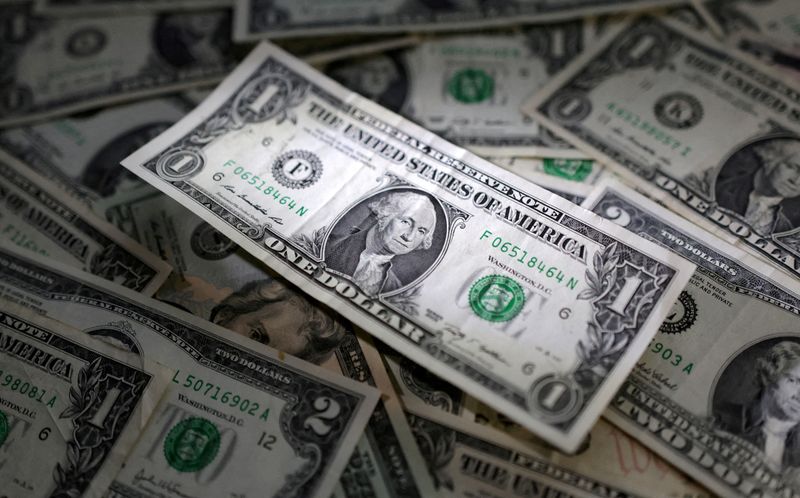
© Reuters. FILE PHOTO: U.S. dollar banknotes are seen in this illustration taken March 10, 2023. REUTERS/Dado Ruvic/Illustration/File Photo
By Rodrigo Campos and Jorgelina do Rosario
NEW YORK/LONDON (Reuters) -A bill backed by debt justice campaigners and civil society groups advocating on behalf of economically distressed countries could alter past and future sovereign debt restructurings covered by New York state law – and Wall Street is watching.
These are some key points about the bill.
WHAT DOES THE BILL PROPOSE?
Senate Bill S4747, the NY Taxpayer and International Debt Crises Protection Act, “relates to New York state’s support of international debt relief initiatives for certain developing countries.” The same bill is making its way in the Assembly.
The bill includes limits to state investments into foreign entities and would include private creditors in “burden-sharing standards” in which they would take the same losses – or “haircuts” – that the United States government would as a sovereign creditor when a low-income country in distress qualifies for debt relief.
The limit of this definition is a point of contention between the advocates of the bill and its detractors.
WHAT ARE THE NEXT STEPS FOR THE BILL?
In the Assembly, the bill passed 14 to 5 in the Judiciary committee and is now awaiting vote in the Ways and Means committee. Alexander Flood, director of communications for Patricia Fahy, the bill sponsor in that chamber, said they are “hopeful” it will be out of committee and up for a full vote next week. At the Senate, it remains at the Judiciary committee.
Time is tight, as the 2023 legislative session ends on June 8. It could get a floor vote as late as June 7, and if same versions are approved it goes to Governor Kathy Hochul who, in the off-session, would call the bill up at her own time. She could sign, veto or amend it – in which case it needs to go back to the sponsors.
WHY IS THE ISSUE SO PRESSING?
A toxic mix of ballooning inflation, escalating borrowing costs and a strong dollar in the wake of COVID-19 and Russia’s war in Ukraine has made repaying loans and raising money significantly more expensive for dozens of developing nations. Some, such as Sri Lanka and Zambia have tipped into default.
Countries on the verge of a debt crisis could be tipped into one if, as detractors say, the bill’s unintended consequences include higher borrowing costs for some issuers.
Emerging markets total debt climbed to over $100 trillion by end-March, a nominal record, according to data from the Institute of International Finance (IIF).
The Group of 20 pledged to streamline debt treatments through its Common Framework platform and seeks comparable relief from bilateral creditors such as the Paris Club and China. The initiative has so far failed to accelerate debt relief talks, while private creditors are not even formally included in this initiative.
WHO ARE THE BILL’S BACKERS?
The bill is supported by major state and national unions and churches, as well as economic development organizations. It would “bring badly needed improvements to the framework for resolving unsustainable sovereign debt burdens,” according to Nobel Prize-winning U.S. economist Joseph Stiglitz.
“The bill helps to add enforcement capabilities – something that the G20 Common Framework lacks even though as a matter of principle it recognizes the need for private sector participation,” said Rishikesh Ram Bhandary, Assistant Director of the Global Economic Governance Initiative at Boston University’s Global Development Policy Center.
“A speedy and orderly economic recovery is in the interest of all creditors,” he said. “Moreover, through this legislation creditors would also have the clarity on what the terms are for everyone else, so this helps inter-creditor equity as well.”
WHY ARE PRIVATE CREDITORS AGAINST THE BILL?
The argument from banking trade group IIF and others is that the bill won’t work as written, with investors concerned their capital would potentially “become hostage to a protracted legal process to define appropriate recovery values.” Additionally, issuers could face higher costs as the legal uncertainty raises risk premiums.
“The bill’s proponents hope to change international debt markets, but the much more likely outcome would be capital flight from New York, ultimately leading to lost income tax and other revenue to the state,” a group of capital markets trade groups, including the IIF and insurers said in a recent statement.
If this bill passes, “I would recommend issuers not go through New York law, (but) through London or any other jurisdiction,” said Rodrigo Olivares-Caminal, professor of banking and finance law at Queen Mary University of London.
The law as written is “way more far-reaching” than covering just the debt of poor and distressed countries and, for example, a Paris Club agreement with U.S. participation and dealing with Brazil, Argentina or other non-low-income country could fall under this if few private creditors are somehow involved, he said.

